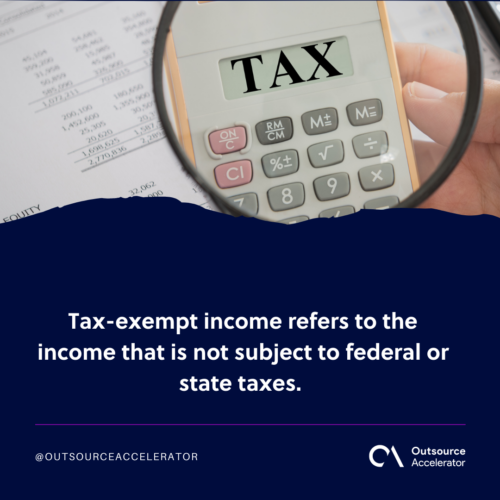Tax-exempt income
Definition
What is tax-exempt income?
Tax-exempt income refers to the income that is not subject to federal taxes or state taxes. It is not included in the taxable income as per Income Tax law.
As of 2023, the standard deduction for single taxpayers has gone up to $13,850, which is the amount of one’s income that’s nontaxable.
Particular organizations such as religious or charitable entities don’t have the obligation to pay taxes — hence, the tax-exempt status.
However, a tax-exempt organization that earns a gross income of $1,000 and above from unrelated businesses should be reported.
Also, non-profit organizations’ earnings or donations proceeds don’t have to pay income tax. These tax-exempt organizations include religious, literary, educational, animal and children protection, local and international sports organizations, and scientific activities or operations.
Meanwhile, gifts affiliated with certain businesses, are subjected to federal income tax. However, a gift worth less than $16,000 (applicable for the year 2022) is exempt from income tax. For example, tuition or medical expenses that are paid for by someone else are tax-exempt.

How does tax-exempt income work?
The rules and regulations that define the tax-exempt income may vary in each country. Taxpayers must understand local, federal, and state taxes and their respective tax codes to see which tax exemptions can apply.
In most cases, taxable income must be stated in your income tax return and is liable to tax. Meanwhile, nontaxable income is a type of income that may be reported in your income tax return but does not require the payee to pay tax.
As per Internal Revenue Service (IRS), there are several types of income that are excluded from tax (partially exempt or non-exempt), including:
- Healthcare benefits/Health insurance
- Social security benefits
- Casualty insurance proceeds
- Roth IRA withdrawals
- Child support payments
- Welfare payments (for instance, disability benefits)
- Reimbursement (mostly in the adoption process)
- Cash rebates purchased from a merchandiser or retailer
- Car rebates
- Alimony payments
- Combat pay
- Inheritance received
- Municipal bond interest
- Public safety officer survivor benefits
- Scholarships and fellowships grants
- Fees or honorarium (Educational)
- Grants or subsidy
These items are considered tax-exempt if they follow guidelines and provisions aligned with the Income Tax Act.
There is a distinction between tax-exempt and tax deductions. In tax deductions, taxpayers who “itemize” can declare certain expenses as tax deductions.
Tax deductions have two types:
- Above-the-line
- Below-the-line
Above-the-line deductions are more advantageous as they reduce the adjusted gross income.
Below-the-line deductions, on the other hand, are used to determine your taxable income, which will subtract from your adjusted gross income.
Generally, it is important to understand tax-exemption income rules. It helps when preparing a tax return which allows one to optimize taxation benefits that can apply to you.







 Independent
Independent




